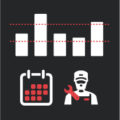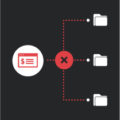Don’t miss out!
Get the latest resources sent directly to your inbox.
How involved are you in accounting at your dealership?
Most dealership owners and/or general managers are rarely accountants. They rely on their controllers or office managers to ensure that accounting is correct and financial statements are accurate and timely. However, you need to be on the lookout for signs that their accounting department could be struggling – or worse.
Managers often claim they need to keep the books open for a few more days after the calendar month ends to pressure the sales team to deliver units. Once this practice starts, it becomes difficult to stop. Having a final date for your sales team to get units delivered is motivational, but be diligent with making it the last day of the month.
The month should end, when the month ends! Once everyone knows that the rule is the month ends on the last day of the month, the pressure will be on just the same as extending the month, and the accounting will be correct.
![]() Extending past the last day of the month is not allowable for public companies via SEC rules, but should also not be allowed for private companies. The end of the month is the end of the month.
Extending past the last day of the month is not allowable for public companies via SEC rules, but should also not be allowed for private companies. The end of the month is the end of the month.
 If monthly statements are not completed by the fifth business day after the month’s end, then the accounting department isn’t closing on a timely basis. This could be considered the general manager’s or owner’s fault. Insist that dealership activities for each month end on the last day of the month, and that statements are available by the fifth working day after the month’s end.
If monthly statements are not completed by the fifth business day after the month’s end, then the accounting department isn’t closing on a timely basis. This could be considered the general manager’s or owner’s fault. Insist that dealership activities for each month end on the last day of the month, and that statements are available by the fifth working day after the month’s end.
![]() Have you set a date with your accounting department for the month to be closed? IS this procedure being followed? If not, why not? Are you aware of the proper steps within IDS Astra G2 that should be performed prior to running the month-end soft close or hard close routines?
Have you set a date with your accounting department for the month to be closed? IS this procedure being followed? If not, why not? Are you aware of the proper steps within IDS Astra G2 that should be performed prior to running the month-end soft close or hard close routines?
 Your accounting department should access online banking information several times a week and reconcile the accounts either every few days or weekly, not monthly. Principals should insist on having bank reconciliations either electronically or on paper by the fifth working day after the month-end. This ensures a timely close and lets the principal review the reconciliation and ensure that there are no unexplainable “adjusting entries.”
Your accounting department should access online banking information several times a week and reconcile the accounts either every few days or weekly, not monthly. Principals should insist on having bank reconciliations either electronically or on paper by the fifth working day after the month-end. This ensures a timely close and lets the principal review the reconciliation and ensure that there are no unexplainable “adjusting entries.”
![]() How to ensure this using Astra G2: Update the Bank reconciliation routine each day and verify the variance between bank and books is zero each day.
How to ensure this using Astra G2: Update the Bank reconciliation routine each day and verify the variance between bank and books is zero each day.
 If the office manager has to explain each month that the revenues or expenses in the financial statement aren’t correct because they actually apply to another month, you’re probably on a cash basis of accounting and not the accrual basis. These methods differ only in the timing of when transactions are recorded in the accounting system.
If the office manager has to explain each month that the revenues or expenses in the financial statement aren’t correct because they actually apply to another month, you’re probably on a cash basis of accounting and not the accrual basis. These methods differ only in the timing of when transactions are recorded in the accounting system.
With cash basis, revenue is recorded when the funds are deposited in the bank, and expenses are recorded when the checks are written. Under the accrual method, revenue is accounted for when earned – such as units delivered – regardless of when the money for these activities is actually received or paid. The accrual method provides for matching revenue with expenses and reflects a more accurate picture of your profit in any given accounting period, month, or year. Get your numbers accurate by using the accrual method of accounting.
![]() How to ensure this using Astra G2: Compare revenues for sales to COS as well as expenses related to each month to see if they are recorded properly via the IDS DMS statement, along with the Full Year Profit & Loss statement.
How to ensure this using Astra G2: Compare revenues for sales to COS as well as expenses related to each month to see if they are recorded properly via the IDS DMS statement, along with the Full Year Profit & Loss statement.
 Vendors and suppliers rarely call unless your dealership has past-due unpaid invoices, or they’ve received a check without an explanation of what the payment is for.
Vendors and suppliers rarely call unless your dealership has past-due unpaid invoices, or they’ve received a check without an explanation of what the payment is for.
Poor accounting can result in past-due invoices and slow payments to vendors and suppliers, leading to poor credit ratings for the dealership. Creditors may question your financial stability and stop shipping parts or providing services. Pauses in the work flow lower productivity, especially in the parts and service departments.
![]() How to ensure this using Astra G2: Monitor the age of your Outstanding A/P invoices via the Manage A/P Invoices menu of G2. Have your accounting personnel explain why any invoices are over 30/60/90 days old.
How to ensure this using Astra G2: Monitor the age of your Outstanding A/P invoices via the Manage A/P Invoices menu of G2. Have your accounting personnel explain why any invoices are over 30/60/90 days old.
One step in closing the month is calculating employee bonuses that are based on monthly results. Rewarding employees based on their department’s activities will motivate them to improve their department’s results. However, these expenses should be calculated and accrued in the same accounting month that the bonus is based on. Otherwise, a major expense is based on the cash method instead of the accrual method. Make sure bonuses are expensed in the correct month, so expenses are matched with revenues.
![]() How to ensure this using Astra G2: Do your accounting personnel know how to record Accrual Journal Entries? Or if you are using IDS Payroll, are your configurations set correctly to record your PR in the proper months for your payroll schedule?
How to ensure this using Astra G2: Do your accounting personnel know how to record Accrual Journal Entries? Or if you are using IDS Payroll, are your configurations set correctly to record your PR in the proper months for your payroll schedule?
 Techs get paid every payday, regardless of when the customer pays for the work. Until the work order is closed, the tech labor on that repair order is collected in an account called work-in-process or WIP. The parts associated with his or her work may also be included in WIP, although parts values on open work orders usually remain in the parts inventory until the work order is closed.
Techs get paid every payday, regardless of when the customer pays for the work. Until the work order is closed, the tech labor on that repair order is collected in an account called work-in-process or WIP. The parts associated with his or her work may also be included in WIP, although parts values on open work orders usually remain in the parts inventory until the work order is closed.
If the open work order is for a customer-pay unit that’s not on your lot, you will probably not get paid. If it’s for a delivered unit on an internal work order, the WIP will be charged to cost-of-sales when the work order is closed, but it’s usually after month-end. If the salespeople and management receive commissions or bonuses based on incorrect gross profit, this will result in an overpayment.
Even worse, if the commission or bonus is recalculated and the adjustment is made to the next check, employees will get upset and productivity will drop. WIP needs to be reviewed daily or weekly, not just at month-end. You have poor accounting controls if someone isn’t controlling WIP.
![]() How to ensure WIP correct in Astra G2: Are you using the Manage Open work orders menu? Can your service managers explain why there are open work orders that are more than 30 days old? Have you subscribed to Repair Event Cycle Time (RECT) to be able to report on timeframes of Ordered Parts?
How to ensure WIP correct in Astra G2: Are you using the Manage Open work orders menu? Can your service managers explain why there are open work orders that are more than 30 days old? Have you subscribed to Repair Event Cycle Time (RECT) to be able to report on timeframes of Ordered Parts?
 The sales manager needs an analysis of year-to-date unit sales to determine the best-sellers. The monthly financial operating statement should summarize unit sales by class, brand, manufacturer or model.
The sales manager needs an analysis of year-to-date unit sales to determine the best-sellers. The monthly financial operating statement should summarize unit sales by class, brand, manufacturer or model.
The DMS operating statement does a good job of analyzing unit sales on the departmental sales gross profit analysis page, the revenue and gross profit page, and the inventory analysis pages, but only if the sales accounts are set up by your accounting staff for this kind of detailed accounting. The sales and cost-of-sales accounts have to be reviewed at year-end. Accounts for discontinued products should be eliminated from the DMS and new sales accounts added to the DMS.
If the “new-other” sales account on your DMS has a lot of sales recorded, Accounting hasn’t kept up with changing sale accounts. Review your DMS – make every line on the revenue, gross profit and inventory pages a meaningful management tool.
![]() How to ensure this is measurable in Astra G2: Are you using the IDS DMS report? Have you examined the breakdown of lines of sales on page 3? Does the lineup on page 3 need to be rearranged or updated if you are no longer selling the lines being reported and have new lines that need to be inserted to the lineup? Are your franchise files set up correctly for your unit inventory mfg/brand/types?
How to ensure this is measurable in Astra G2: Are you using the IDS DMS report? Have you examined the breakdown of lines of sales on page 3? Does the lineup on page 3 need to be rearranged or updated if you are no longer selling the lines being reported and have new lines that need to be inserted to the lineup? Are your franchise files set up correctly for your unit inventory mfg/brand/types?
Nothing is worse than a statement with a significantly lower net income than the preliminary year-end statement, especially to creditors who received quarterly financial statements, in which expenses or cost-of-sales aren’t properly reflected.
The explanation for a loss in the fourth quarter is often “end-of-year adjustments.” Year-end adjustments that increase expenses or cost-of-sales usually result from not accruing all expenses on a monthly basis or not reflecting the market value of your inventories before year-end adjustments. The value of used inventory or obsolete parts doesn’t change on the last day of the accounting year; it changes throughout the year.
Follow established accounting principles for valuing inventories for all statements sent to your creditors. Monthly accruing of non-cash expenses, such as depreciation and amortization, will greatly improve the accuracy of the financial statements. If your office manager is waiting for the 13th statement to make these adjustments, the interim statements aren’t accurate.
 The office manager should insist on monthly reviews of operating results with the management team. At a minimum, the office manager and general manager should share detailed revenue results for each department with the respective manager during a monthly meeting.
The office manager should insist on monthly reviews of operating results with the management team. At a minimum, the office manager and general manager should share detailed revenue results for each department with the respective manager during a monthly meeting.
The more you involve the management team in their departments’ performance, the more they’ll control expenses and the better they’ll understand their departments’ contribution to dealership profitability. The managers’ buy-in will improve your bottom line.
![]() Are your parts department employees utilizing the Cycle Counts feature available in Astra G2 to record monthly or quarterly parts inventory variances? Are you conducting a unit inventory physical count on a monthly basis? Are you inputting write-downs on aged unit inventory on a timely basis? Are you recording depreciation and amortization monthly?
Are your parts department employees utilizing the Cycle Counts feature available in Astra G2 to record monthly or quarterly parts inventory variances? Are you conducting a unit inventory physical count on a monthly basis? Are you inputting write-downs on aged unit inventory on a timely basis? Are you recording depreciation and amortization monthly?
Get the latest resources sent directly to your inbox.